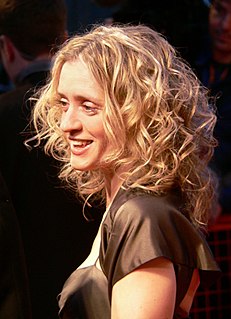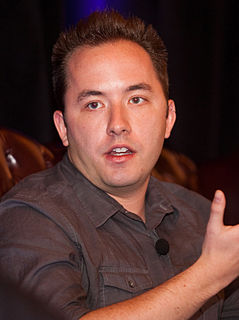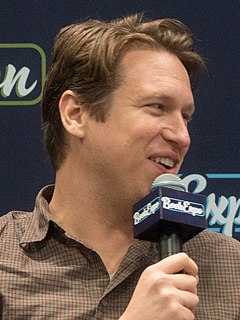A Quote by Jonathan Stroud
The important thing about any book is that you have to have a good story and that it has to be exciting. Then it's nice to add other levels underneath that people can pick up on.
Related Quotes
Too many writers think that all you need to do is write well-but that's only part of what a good book is. Above all, a good book tells a good story. Focus on the story first. Ask yourself, 'Will other people find this story so interesting that they will tell others about it?' Remember: A bestselling book usually follows a simple rule, 'It's a wonderful story, wonderfully told'; not, 'It's a wonderfully told story.'
If I'm writing a story and you're reading it, or vice versa, you took time out of your day to pick up my book. I think the one thing that will kill that relationship is if you feel me condescending to you in the process. And how does that happen? Well, it happens when I know more than you do, and when I know that I know more than you do, and I'm holding it back from you. So that I can then manipulate you at the end. You know, you think about like in a dating situation how terrible that would be, it's the same thing with a book.
There's a great temptation to throw things in, as you put it, that you think are neat, or that you have a very clear, specific memory of and think you could do a good job writing about. What I find is that it's like a seed you plant. You can try it, and if it will grow and connect with other ideas in the book, and you can see connections that you can actually realize on the page, then you're allowed to leave it in. But if it just kind of lies there and doesn't really add up to anything or there's no chemistry with everything else going on in the book, then you have to take it out.
I think age is sometimes just a number. But it's a real joy. Young actors don't come with any of the baggage that we load ourselves up with. They're not worried about their profile, they're not worried about how good they look, or all the nonsense. They just tell the story and ask: "What happens in this scene?" Well, I'll do that then. And professionally it's good for you because it means that you're forced to do the same thing, and that's always a good thing.
Comic books are just a way to show a story. Then there are the movies, and television and exhibits like this that take the stories and make them seem so realistic. In the comic book, you're just reading a story - hopefully a good, exciting story that whets your appetite for all of this stuff to come.
An illustrator in my own mind - and this is not a truth of any kind - is someone who so falls in love with writing that he wishes he had written it, and the closest he can get to is illustrating it. And the next thing you learn, you have to find something unique in this book, which perhaps even the author was not entirely aware of. And that's what you hold on to, and that's what you add to the pictures: a whole Other Story that you believe in, that you think is there.
Secrecy fuels erotic intensity because it makes you feel like you're doing something that is entirely yours. It gives you the sense of autonomy, the sense of freedom, and the sense of sovereignty. And then you add to that the sexual energy. In many affairs, people will tell you they slept with the person three or four times, but the story went on for months. That's an important thing because many people who have affairs often have very good sexual relationships at home. It's not necessarily a compensation story. But affairs offer a different sexuality with a different context.
We've all had the experience of you pick up a book, you can't get into it, you can't concentrate.Then one day you pick up the same book and you don't hear the phone ring. You're totally absorbed. Same thing I have to do every day. When you get into that special place of unconsciousness - you get it listening to great music or seeing a great movie - it just takes you out of yourself, out of this whole world. There's no feeling quite like it.
The only real reason for self-referencing is the fun factor. It's fun for the writer, getting little peeks at what old characters might be up to. And it's fun for readers to spot a familiar face, or pick up on a made-up book title or something from an earlier story. I don't know that it does -- or even should -- contribute to the story in hand being any better than it would have been without it.

































